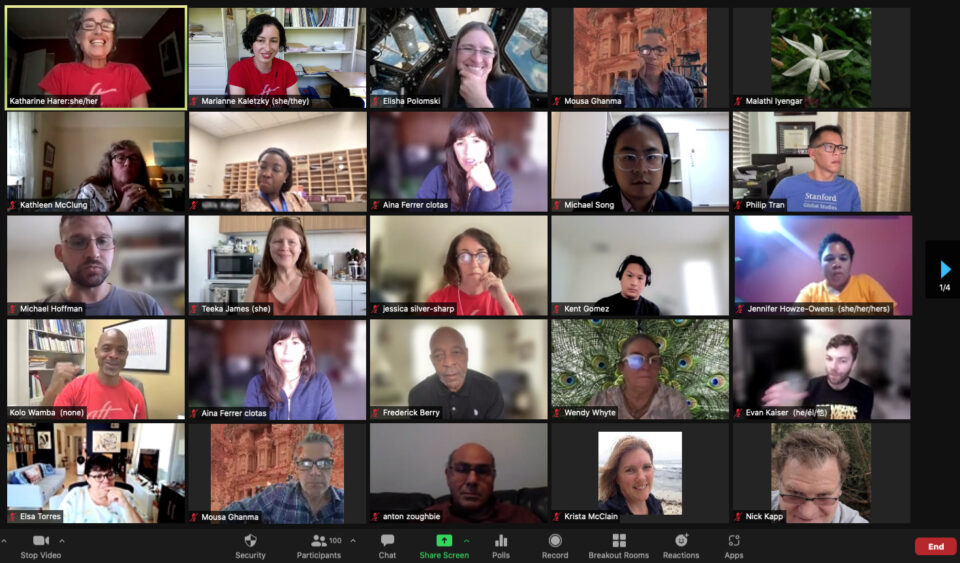Workload program
Answering questions about the pilot workload point system
The recent introduction of a pilot workload point system for full-time faculty in our district has prompted some confusion among faculty members. In this article we want to address some of the practical questions that have arisen as the system has begun to roll out.
But why do we need this new system? Because faculty workload increased dramatically over the years, and faculty were being asked to do anything that fell under “duties of faculty”, without any regard for total workload. After many years, we were able to negotiate this point system, whose main purpose is for full-time faculty to be able to QUANTIFY and LIMIT the amount of work we do. Any work you do outside of teaching classes, counseling students, or providing librarian services should be included in your points. By documenting this previously unrecorded, unaccounted for, and uncompensated faculty work, the point system gives us a tool to draw clear limits on the amount of work we do and allows us to prioritize serving students in our core roles (as instructors, counselors, librarians, etc.) rather than struggling with an unmanageable amount of service work. Faculty should also remember that this is a PILOT program. The AFT will be monitoring how this program works in order to try to refine it and improve it. We want to hear from faculty about any difficulties you have with the system so we can renegotiate the details of how it’s implemented and incorporate all that we learn during this pilot period.
As the workload point system has begun to be implemented this semester, various issues have arisen. The main ones that we are aware of are described below, along with how we are trying to address each of them
Workload form submissions
AFT and Deans both lack any record of the forms faculty members submitted in the Spring itemizing their draft faculty Professional Responsibilities Plan (PRP.) Without the ability to review faculty plans, the union is unable to adequately facilitate the process or analyze or reflect on the process once it’s completed. The union is currently trying to work with HR to find a way to provide faculty (and Deans) with copies of their PRP.
Inconsistencies between divisions in what points are allowed for different work
There have been inconsistencies in how different divisions have implemented or applied the points system. For example, some Deans have denied all faculty points for the role of department lead, while some faculty who are department leads are not even aware that they can take points for this role on top of other department work they’ve included in their Plan. Deans cannot unilaterally reject or change a faculty member’s PRP unless they do so for one of the reasons listed in the contract. (Some legitimate reasons to tell a faculty member they must change their plan may be that too many people in the department have included the same task on their Plan, or not enough people have included a tenure committee or another type of work immediately necessary to the department. See Article 6.5.1 for all reasons a dean may ask a faculty member to change their PRP.) Faculty may not be pressured, coerced or manipulated by administrators to do particular work. This is exactly what the workload point system is set up to prevent. AFT will be working with administration to provide better communications around these types of ambiguous areas to ensure clarity and uniformity across the district.
What to do if a faculty member must exceed the required number of points
There may be a time-sensitive institutional need that requires a faculty member who is already in the middle of completing a Professional Responsibilities Plan which fulfills all of their points to take on an additional work assignment (e.g. a new committee appointment) for which they have the expertise and a willingness to take on but which will put them over their required points. In this case, the faculty member has the option to carry over any excess points from year 1 to year 2 of the pilot, or be paid for the extra hours. While such situations would not be expected to be very common, the District must provide funding to pay faculty who have been asked and are willing to take on work above their required point total. Division budgets are not currently set up for this process to work. AFT plans to discuss this issue with administration to ensure that faculty who legitimately take on approved work beyond their required point total will be paid for that extra work.
Coming soon: forums and survey
AFT is also working on: 1) setting up forums to hear about faculty’s concerns and answer questions about the workload point system process, and 2) planning a survey to gather information about faculty members’ experiences, concerns and suggestions for improving the system. You will be hearing more about the forums and the survey soon.
In the meantime, if you have questions about the workload system, please reach out to colleagues in your department or division or to your union representatives. Finally, remember that if there is disagreement between you and your Dean regarding your allocation of workload points, the matter can be referred to a workload pilot review committee comprised of Steve Lehigh (AFT rep), Kate Browne (Academic Senate rep), Aaron McVean (Vice Chancellor of Educational Services and Planning) and David Feune (Director of Human Resources).
Faculty have long expressed a need for a way to quantify and limit full-time service work, and now that the points system is in place, AFT leaders are committed to helping you make it work for yourself and your colleagues. Together we can keep shaping a structure that allows full-timers to assert our right to a reasonable workload. With a fair workload faculty will be able to better avoid burnout and ultimately provide our students with the highest quality education.



 On Flex Day, Monday, August 15, I attended the AFT Contract workshop. I look forward to AFT workshops as a time to discuss critical issues and engage old friends and colleagues. It was great listening to and discussing contract issues with the warriors on the front lines. They rigorously represent not only the needs and concerns of full-time faculty, but also those of the vast number of part-timers like me—we are never left behind. There were several important full-time and part-time faculty issues discussed with specific proposals that are being negotiated by our team. I just want to say: Thank you team!
On Flex Day, Monday, August 15, I attended the AFT Contract workshop. I look forward to AFT workshops as a time to discuss critical issues and engage old friends and colleagues. It was great listening to and discussing contract issues with the warriors on the front lines. They rigorously represent not only the needs and concerns of full-time faculty, but also those of the vast number of part-timers like me—we are never left behind. There were several important full-time and part-time faculty issues discussed with specific proposals that are being negotiated by our team. I just want to say: Thank you team!